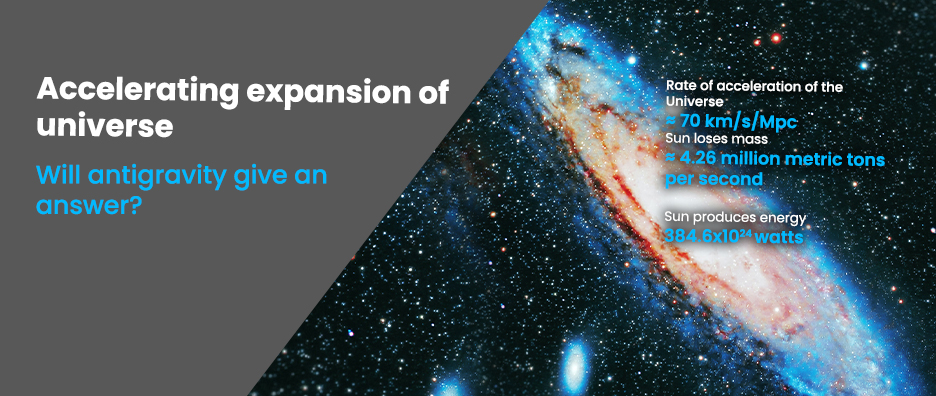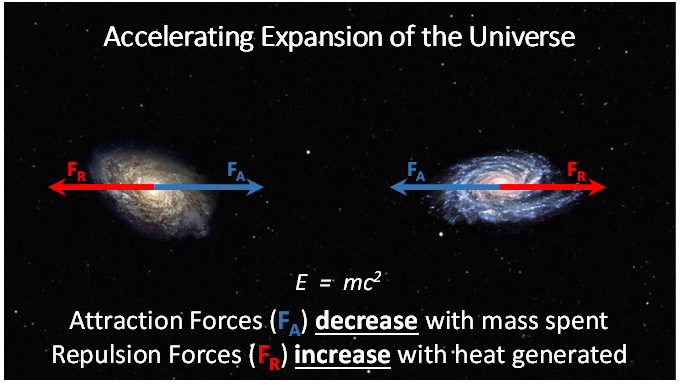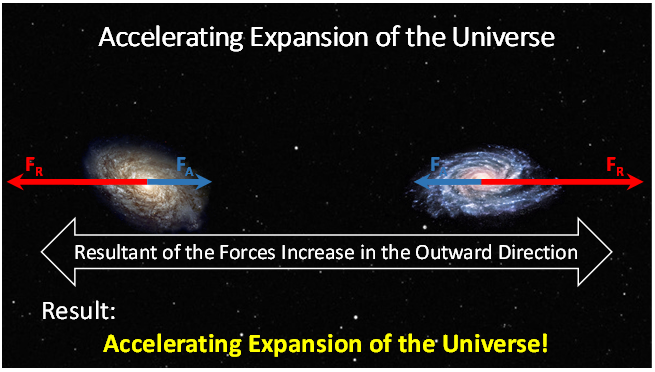
Thermal expansion & State change of matter
Thermal expansion & State change of matter Predominant Existing Theory A given atom may rest in its equilibrium position, r0, i.e., at the minimum of


The phenomenon ‘Accelerating Expansion of Universe’ (Perlmutter et al., 1998, Riess et al., 1998) is based on the observation that galaxies are moving apart from each other at accelerating pace. This is happening despite gravitational forces among all galaxies, possibly in all celestial objects, irrespective of their masses. At present there are two main theories that try to interpret this phenomenon:
‘Big Bang’ Theory, is a (albeit widely trusted) model of the origin of the universe. One may infer from that, the universe is still moving apart. A pertinent question to answer is why every galaxy is running away from each other and not spreading away from the nucleus point of the ‘Big Bang’. According to the ‘Big Bang’ model, we could only expect matter running away radially from the point of explosion with a constant or decreasing speed.
‘Dark Energy’, which is nothing but a prudent guess, scientists have taken refuge in explaining the observed expansion of the universe; a way out of an explanation. Many scientists speak of Dark Energy existing in the outer space. But, they do not consider Dark Energy as existing in our surroundings on earth; neighbourhoods, villages, towns, et cetera. Everything else (subatomic particles, atoms, molecules, electromagnetic energy, etc.) do exist everywhere in the universe; including our surroundings on earth! How come Dark Energy exists only in the outer space? Such perspective is not close to our experiences on our surroundings. Nothing convincing has come up by inviting this mysterious entity of dark energy, and hence, it is a weak candidate.
‘Gravitational Repulsion Force’ considered in addition to the gravitational attraction force, enables more simple and straightforward explanation of accelerating expansion of the universe. Such thinking is not completely uncharted. An extra force besides gravity has been mentioned in ‘Principia Mathematica’ (Newton et al., 1729) published by Isaac Newton in 1687; see Prepositions XLIII-XLV of Book 1, pp171-182. A plausible explanation to the accelerating expansion of the universe, in fact, rests on explaining why galaxies are moving apart at increasing speeds; instead of constant speeds, as stated by Newton’s First Law of Motion. If only the attraction gravitational force exists, the universe must shrink together and finally collapse. Instead, it is expanding and the galaxies are repelling each other.
As gravitational attraction is caused by the mass, the gravitational repulsion is caused by the thermal energy. Please see Figure 1

It is logical to sense a repulsive force among the celestial bodies of universe. The universe and galaxies are analogues to clouds and cloud particles. In a cloud, however, cloud particles (water droplets) are confined to a relatively stationary volume. They are in equilibrium as gravitational repulsion and attraction forces among them are unchanged. This is due to the constant amount of mass and thermal energy in the cloud.
Elements in the universe are continuously accelerating away from each other. This could be easily explained by thermal energy produced continuously by mass energy conversion in every galaxy (see Figure 2) containing millions of stars (Poincaré, 1900, Einstein, 1905). Attraction forces decrease with mass spent, repulsion forces increase with heat generated (see Figure 3), causing accelerating expansion of the universe.


Existence of both decreasing attraction and increasing repulsion forces in the universe maintain its dynamic nature. Such phenomenon can exist not only between galaxies in the universe but among each and every particle or entity in the universe. If thermal energy causes accelerating expansion of the universe at the macroscopic level, similar phenomenon should happen at the microscopic level as well among atoms of solids, liquids and gases; probably at subatomic level as well. Expansion of gases on heating (Charles’s Law) is one straight forward example.
Considering the theory discussed (see webpage ‘Beginnings’ ) using examples iodine in vacuum and water droplets in air, it is clearly demonstrated that there is a force existing against the direction of gravitational attraction. Those experiments further show that this repulsive force is attributable to and proportional to heat energy [temperature (which is a manifestation of the thermal energy content)] of particles being subjected to repulsive forces. This knowledge is further explained in the most interesting natural phenomena in the nature: the existence of clouds in mid-air where the water droplets exist/remain as a floccule, maintaining distance among each other, neither collapsing nor dispersing/spreading out. If each particle consumes its mass to produce heat, simultaneously increasing repulsive force and decreasing attraction force should cause an increasing resultant repulsive force among the particles. This is what exactly is happening in the universe among galaxies; presently believed to be caused due to dark energy.
With our fundamental physics knowledge, it is clear that, to cause an acceleration, a constant force must be applied, which implies that the energy must be supplied to the system continuously. This implies that Dark Energy is nothing else but thermal energy which causes expansion not only in matter in general but also in the universe itself!
References:

Thermal expansion & State change of matter Predominant Existing Theory A given atom may rest in its equilibrium position, r0, i.e., at the minimum of

Convection – Rising heated air molecules According to the existing definition: Convection is the transfer of heat vertically from one place to another, by bulk

Upward motion of condensed water droplets in still air Upward motion of water droplets when not supported by convection currents has been observed (Piyadasa, 2012),